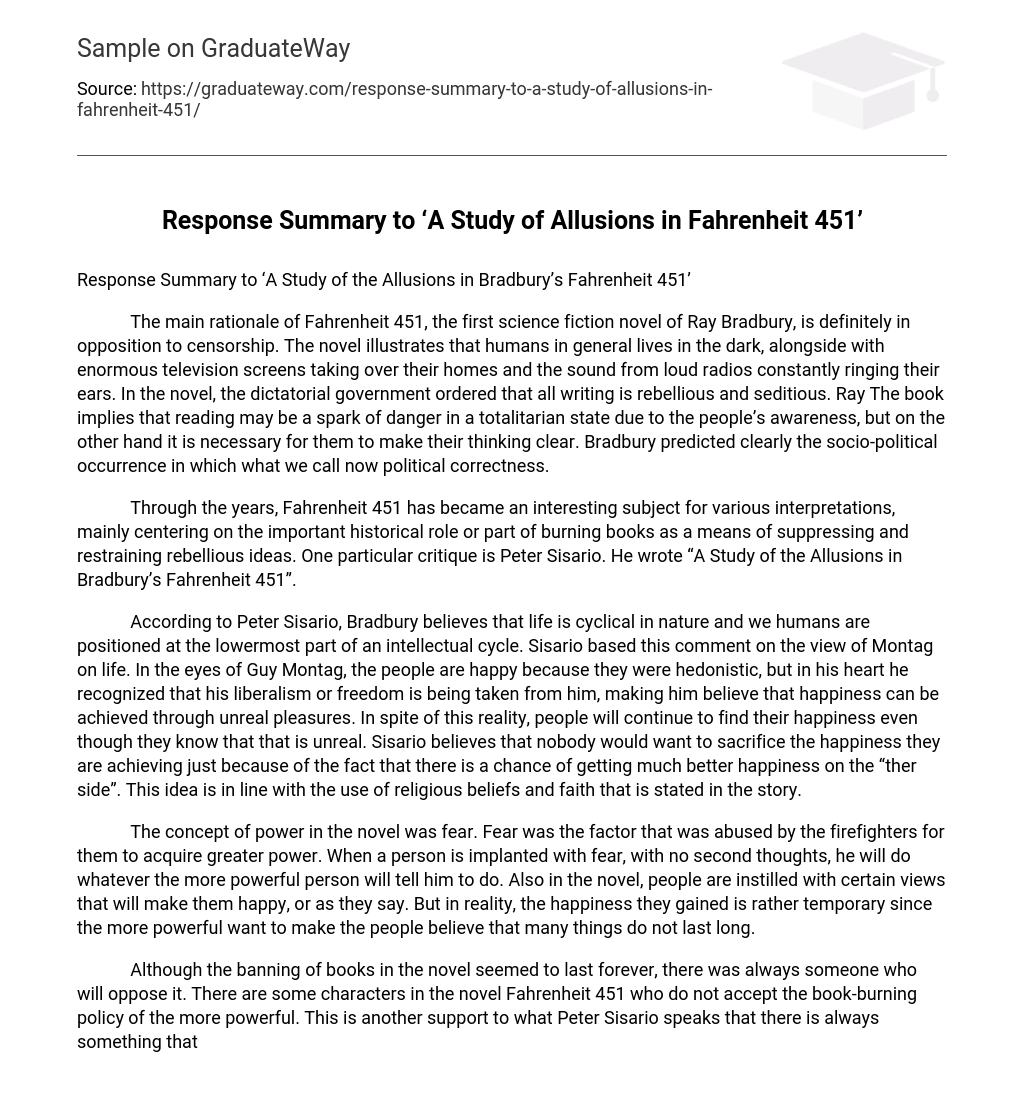Response Summary to ‘A Study of the Allusions in Bradbury’s Fahrenheit 451’
The main rationale of Fahrenheit 451, the first science fiction novel of Ray Bradbury, is definitely in opposition to censorship. The novel illustrates that humans in general lives in the dark, alongside with enormous television screens taking over their homes and the sound from loud radios constantly ringing their ears. In the novel, the dictatorial government ordered that all writing is rebellious and seditious. Ray The book implies that reading may be a spark of danger in a totalitarian state due to the people’s awareness, but on the other hand it is necessary for them to make their thinking clear. Bradbury predicted clearly the socio-political occurrence in which what we call now political correctness.
Through the years, Fahrenheit 451 has became an interesting subject for various interpretations, mainly centering on the important historical role or part of burning books as a means of suppressing and restraining rebellious ideas. One particular critique is Peter Sisario. He wrote “A Study of the Allusions in Bradbury’s Fahrenheit 451”.
According to Peter Sisario, Bradbury believes that life is cyclical in nature and we humans are positioned at the lowermost part of an intellectual cycle. Sisario based this comment on the view of Montag on life. In the eyes of Guy Montag, the people are happy because they were hedonistic, but in his heart he recognized that his liberalism or freedom is being taken from him, making him believe that happiness can be achieved through unreal pleasures. In spite of this reality, people will continue to find their happiness even though they know that that is unreal. Sisario believes that nobody would want to sacrifice the happiness they are achieving just because of the fact that there is a chance of getting much better happiness on the “ther side”. This idea is in line with the use of religious beliefs and faith that is stated in the story.
The concept of power in the novel was fear. Fear was the factor that was abused by the firefighters for them to acquire greater power. When a person is implanted with fear, with no second thoughts, he will do whatever the more powerful person will tell him to do. Also in the novel, people are instilled with certain views that will make them happy, or as they say. But in reality, the happiness they gained is rather temporary since the more powerful want to make the people believe that many things do not last long.
Although the banning of books in the novel seemed to last forever, there was always someone who will oppose it. There are some characters in the novel Fahrenheit 451 who do not accept the book-burning policy of the more powerful. This is another support to what Peter Sisario speaks that there is always something that lurks around and will continue to be around. The “someone” who opposed the book-burning was portrayed by the character of Clarisse, a teenager who rejected the concept self-contentment and just wanted to continue her freewill, enjoy nature and her questioning. This “free human spirit” stated by Sisario will always be around us. In every particular thing, there would be its opposite. That is the cycle of life and we can do nothing to change this fact. In every thesis, there is the anti-thesis. The result of this contradiction will be their synthesis. That is the process of life. With this fact, humans will continue to grow and evolve since there is always a room for change. As the saying goes: “Nothing is constant but change”.
Reference:
Sisario, Peter. “A Study of the Allusions in Bradbury’s “Fahrenheit 451”
The EnglishJournal, Vol. 59, No. 2 (Feb, 1970), pp. 201-212.





